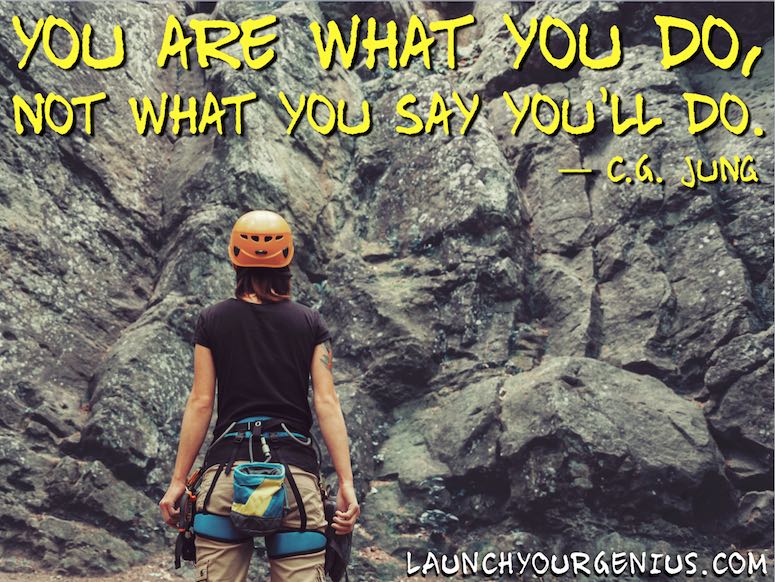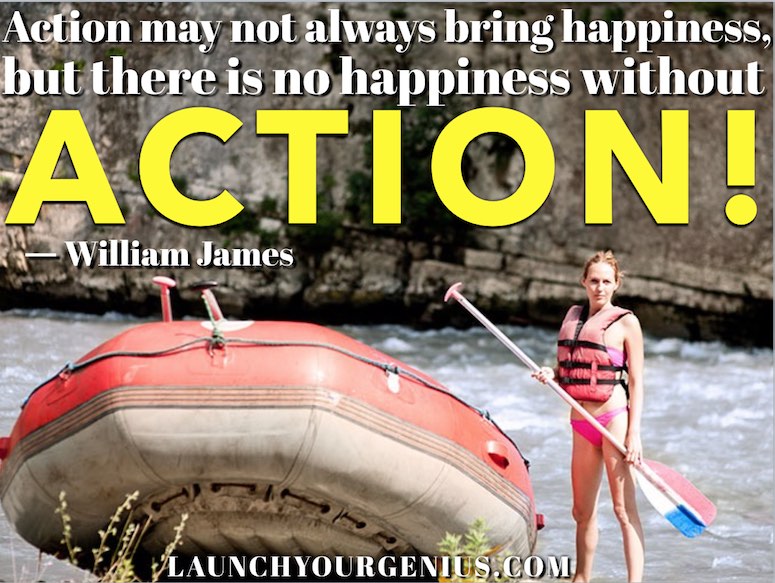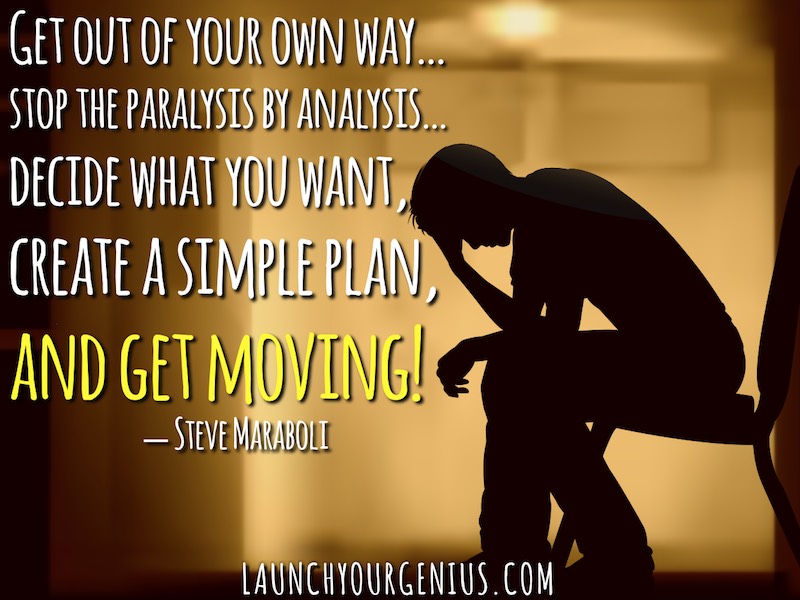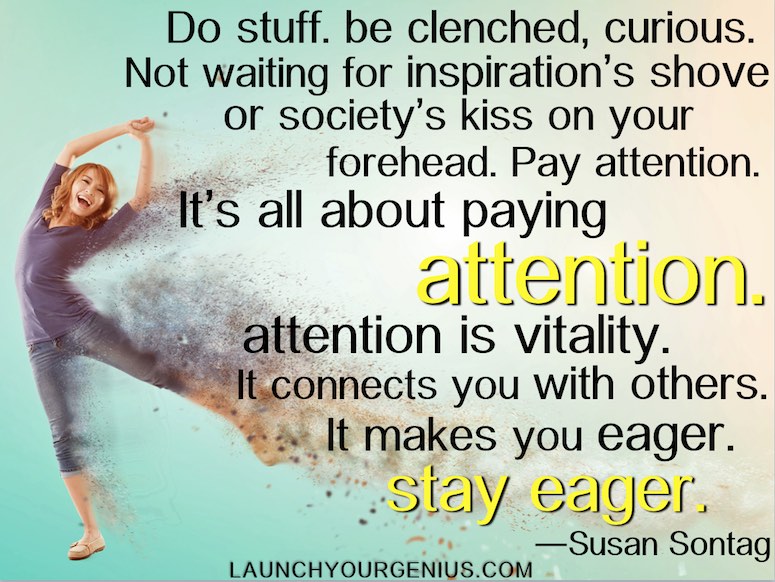“You are what you do, not what you say you’ll do.” ― C.G. Jung
Many of us want to take massive action. Most often, we also have the best intentions in mind.
If you are like me, you have excitedly made plans and elaborate ideas on how to proceed further in your plans.
It could be:
- New years resolutions.
- That project that is due in a few weeks.
- Decluttering your home.
You have thought of your idea, read the books, researched the field and set a firm intention to achieve greatness.
But then, nothing happens. You begin with great momentum and soon you begin losing steam.
Other commitments begin creeping in and distracting your grand intentions and well laid-out plans.
Despite your best intentions and feelings about the task at hand, the massive action does not happen.
What happens is last minute patch-up and a band-aid kind of fix and you feel like you are not ready. You feel like you have fallen short. You feel like you have sold and given in to the pressures, tensions and busyness of life.
What makes you take, sustain and retake massive action day in and day out? The kind of action that you wanted to take but never got around to doing so.
Are there any psychological principles and ideas that can sustain and promote great action?
“Action may not always bring happiness, but there is no happiness without action.” ― William James
Let us jump right in!
1. Ditch Analysis Paralysis and Overthinking: Make Choice Work For Your Massive Action
“Get out of your own way… stop the paralysis by analysis… decide what you want, create a simple plan, and get moving!” ― Steve Maraboli, Unapologetically You: Reflections on Life and the Human Experience
Let us be honest. How many times have you wanted to take action but have felt bogged down by analysis in your head that never ends?
There are thinkers and over thinkers and there are analyzers.
And there are people who know when to stop thinking and begin taking action.
Too much choice along with an inclination for analysis is the ripe ground for decision and action paralysis.
Psychologist Barry Schwartz has shown in his work that excessive choice can decrease our levels of happiness. Excessive choice can also cause paralysis.
Stop thinking and begin acting.
Action Tips:
1. Assess your life and see if you have too much choice, too many projects and too much information?
2. Are you able to move forward despite the choice?
3. Can you decrease the number of projects and choices so that you do not experience overwhelm?
4. Be decisive and narrow the choices quickly to take massive action.
“If you spend too much time thinking about a thing, you’ll never get it done.”- Bruce Lee
2. The Dilemma Of InAttention
“Do stuff. be clenched, curious. Not waiting for inspiration’s shove or society’s kiss on your forehead. Pay attention. It’s all about paying attention. attention is vitality. It connects you with others. It makes you eager. stay eager.”― Susan Sontag
Psychology and mind science have shown us that humans can only process 50 to 100 bits of information at a given moment.
What this means for your action is that it is not enough to have the intention to take action.
It is not enough to make a list and put it away somewhere safe.
You have to have the action item right in front of you and getting back into your attention span for you to take consistent action on.
When you are constantly reminded of the one item that you need to take massive action, you do it.
When you never allow action items to get too far from your awareness, you can naturally take action.
When the item is out of sight, it becomes out of mind.
I use notifications on my phone and make folders on my desktop reminding me of what I need to do. The idea is to keep reminding yourself of the need to take massive action.
If you want to run, keep your running shoes where you can see them every day. If you want to paint, keep your painting supplies in plain view and not stowed away in a closet.
3. Exhaustible Will Power: Maximum Impact
“The germ of success in whatever you want to accomplish is in your willpower.” ― Paramahansa Yogananda
Research has shown that willpower is exhaustible. We do not have unlimited sources of willpower to use at our free will and call. The choice that we do have is how to use that willpower wisely.
Do you prioritize which actions receive your best willpower?
Do you create distraction-free zones where you can take massive action?
Remember that every distraction and discussion that is contextually irrelevant to your action plan is exhausting your willpower.
Do you know when your willpower is at its maximum and how you can replenish it?
Research has also shown that our attention diminishes after 40 to 45 minutes of intense thinking and activity. It is best to take a break, even if it is a very short one to get your attention back up.
Continuous action without short breaks might not be sustainable.
4. Become Unstoppable by Quitting Learned Helplessness and Ditching Excuses
“Learned helplessness is the giving-up reaction, the quitting response that follows from the belief that whatever you do doesn’t matter.” – Arnold Schwarzenegger
Learned Helplessness was discovered by the renowned psychologist Martin Seligman.
Learned helplessness is the state that borders on the feelings of powerlessness. You feel helpless to create change.
If you are avoiding taking action, it may be because you have trained yourself to be helpless in a particular situation.
This happens when you experience events that are beyond your realm of control, often resulting in failure and defeat.
This feels unpleasant but you forget that every setback is temporary. Instead, you train yourself to believe that this area is something that you are not good at.
You may create neural networks and pathways that bolster the initial failure and feelings of helplessness. You may actively find evidence to support your claim that you are no good in that situation.
This happens a LOT with creativity. When I was young, someone laughed at a song that I was singing calling it was out of tune. I was very upset and believed them.
For a very long time, I felt shame and felt uncomfortable while singing in the shower or otherwise. I thought I was no good.
I avoided singing situations entirely. I primed or conditioned myself to believe that I could not learn how to keep a tune. Of course, with some training and practice I could do fine but I was deep in the clutches of learned helplessness.
You may have a story of your own that you are using to make excuses and feel helpless to not take action in a realm in your life. But believe this that you are not alone in this.
If you want to take massive action, confront learned helplessness and questions those false claims about you being not good enough.
Take action and become better at things that you thought that you were no good in. You will feel the familiar pangs of the uncomfortable but stay with them and take action anyways.
5. Is an Ideal vs. Reality Conflict Preventing Massive Action?
“Faith is about doing. You are how you act, not just how you believe.”― Mitch Albom, Have a Little Faith: a True Story
When we hold two conflicting views of reality, we experience cognitive dissonance or discord that demands resolution. This state of an Ideal Reality conflict is damaging for taking massive action.
The ideal demands perfection from you. You say that “I will write for 2 hours everyday.”
The reality is that you do not have the time for more than 20 minutes.
Now this is not acceptable to your higher sensibilities and you feel like a loser, and you feel shame. You feel like you have sold out on your ideals.
This conflict between writing more and the pressures of life and reality paralyze you. You experience such strong conflicting emotions that you stop writing entirely. You take the path of least resistance.
What is your ideal reality conflict preventing you from taking massive action?
6. Beyond Emotional Fusion
“All human actions have one or more of these seven causes: chance, nature, compulsion, habit, reason, passion, and desire.”― Aristotle
It may come as no surprise to you that emotional states are highly contagious. And they are more potent if the person you are interacting with is important in your life like a good friend or a family member.
When you are around happy people, you may feel elevated.
When you are around negative and critical people, you may feel anxious and negative yourself.
What is the state of emotional fusion?
Emotional Fusion happens when you cannot easily differentiate between which emotional state belongs to others and which one belongs to you. You may not be immune to assuming other people’s emotional states. And this mix and match is emotional fusion.
When you are taking massive action, mindset and emotional states are important. If you are absorbing other emotional states, you will find it difficult to stay focused.
If you have an interaction that is less than favorable, instead of action you focus on thinking and feeling. You snap out of your zone and get dragged emotionally into the stories and dramas of other people.
Action Tips:
1. Differentiate between your conscious emotional state and that of others.
2. Refuse to get dragged into the drama that other people bring into your action hour.
3. Set mental boundaries for where you are willing to go when you have a distraction.
4. Consciously bring your awareness into a mindset that facilitates massive action.
5. Focus on your priorities, not the stories that others drag you into.
6. Remember it is ok to have your own solid emotional state that allows you to take massive action even if others get angry that you are unwilling to engage.
7. Deep Practice and Get Into The Flow or The ‘Zone’ to Take Massive Action
“Enjoyment appears at the boundary between boredom and anxiety, when the challenges are just balanced with the person’s capacity to act.”― Mihaly Csikszentmihalyi
Flow is that state of calm when time seems to have come to a standstill and when you are deeply engaged and focused at the task at hand.
Nothing else seems to matter at that moment and you are simply doing and engaging, and not thinking or feeling.
From flow researcher Mihaly Csikszentmihalyi’s work, I believe that Flow states happen when:
You do what you like to do.
+
You are working at a relatively high skill level and pushing to get better. You might be a bit fearful but you are also excited.
+
The difficulty level is a challenge for you, and you are working at the edge of your skill level. You are certainly in your zone of growth or discomfort.
+
You are completely involved or focused and free of distractions and experience immersion.
+
You are intrinsically motivated, you are not overthinking and simply acting.
Researchers have also called this deep practice.
“But it is impossible to enjoy a tennis game, a book, or a conversation unless attention is fully concentrated on the activity.”― Mihaly Csikszentmihalyi
Now we all have a slightly different way to get into the flow. For some, it is music from the past that takes them into the zone. For others, it could be a ritual to warm up their hands on a piano.
Whatever your ritual is to get into the zone, engage in it and increase the number of flow experiences.
Flow makes taking massive action meaningful and makes you intrinsically motivated.
You begin craving the flow experience for the clarity and the intensity that it inevitably provides you.
According to Mihaly Csikszentmihalyi from his book: Flow: The Psychology of Optimal Experience:
“Contrary to what we usually believe, moments like these, the best moments in our lives, are not the passive, receptive, relaxing times—although such experiences can also be enjoyable, if we have worked hard to attain them. The best moments usually occur when a person’s body or mind is stretched to its limits in a voluntary effort to accomplish something difficult and worthwhile. Optimal experience is thus something that we make happen. For a child, it could be placing with trembling fingers the last block on a tower she has built, higher than any she has built so far; for a swimmer, it could be trying to beat his own record; for a violinist, mastering an intricate musical passage. For each person there are thousands of opportunities, challenges to expand ourselves.”
The star swimmer Michael Phelps has a ritual that involves listening to music and certain stretches and movements that allow him to go into the flow before a competition.
The composer Igor Stavinsky got into a creative flow by sitting at the piano the first thing in the morning and playing a fugue from his hero, the legendary composer Bach.
Now over to you. Do you have any tips or suggestions that allow you to take massive action?








Comments